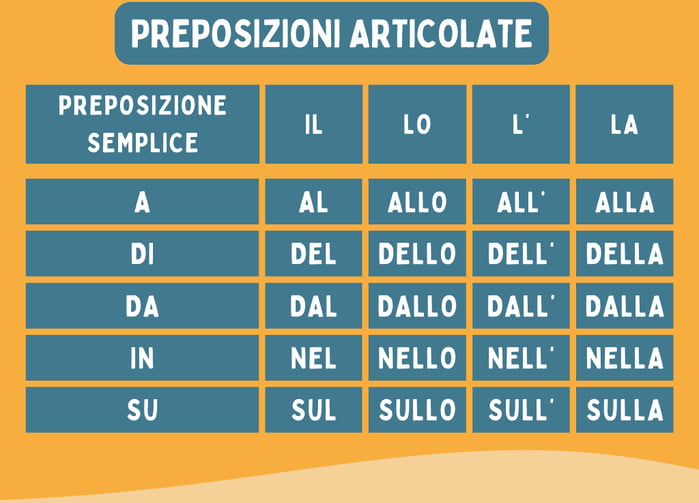The Articulated Prepositions in Italian
GRAMMATICA
The Articulated Prepositions in Italian
Articulated prepositions are a fundamental part of Italian grammar. Understanding and using them correctly can significantly improve your ability to communicate in Italian. In this article, we’ll explore what articulated prepositions are, how they are formed, and how they are used.
What Are Articulated Prepositions?
Articulated prepositions are combinations of a simple preposition and a definite article. In Italian, the simple prepositions are: di, a, da, in, con, su, per, tra, fra. When these prepositions are combined with the definite articles (il, lo, la, l’, i, gli, le), they form articulated prepositions.
Formation of Articulated Prepositions
Here is a table showing how articulated prepositions are formed by combining simple prepositions with definite articles:


Using Articulated Prepositions
Articulated prepositions are used to indicate relationships of possession, place, time, and other circumstances. Let’s look at some examples to clarify their usage:
1. Possession:
• Il libro del ragazzo (The boy’s book)
• La casa della mia amica (My friend’s house)
2. Indicating a Place:
• Sono al parco (I am at the park)
• Andiamo allo stadio (We are going to the stadium)
3. Indicating Time:
• Ci vediamo alla sera (We’ll see each other in the evening)
• L’incontro è alle tre (The meeting is at three o’clock)
4. Indicating a Means or Instrument:
• Parla con il telefono (He/She is speaking with the phone)
• Viaggiamo con l’aereo (We travel by plane)
Some Useful Tips
• Memorization: Learning articulated prepositions can seem difficult at first, but with practice, it becomes natural. A good way to memorize them is to read a lot in Italian and pay attention to how they are used.
• Practice Exercises: Do completion and translation exercises. For example, take a sentence in Italian and try to replace simple prepositions with articulated ones where necessary.
• Conversation: Use articulated prepositions in your daily conversations. The more you use them, the more comfortable you will become with them.
